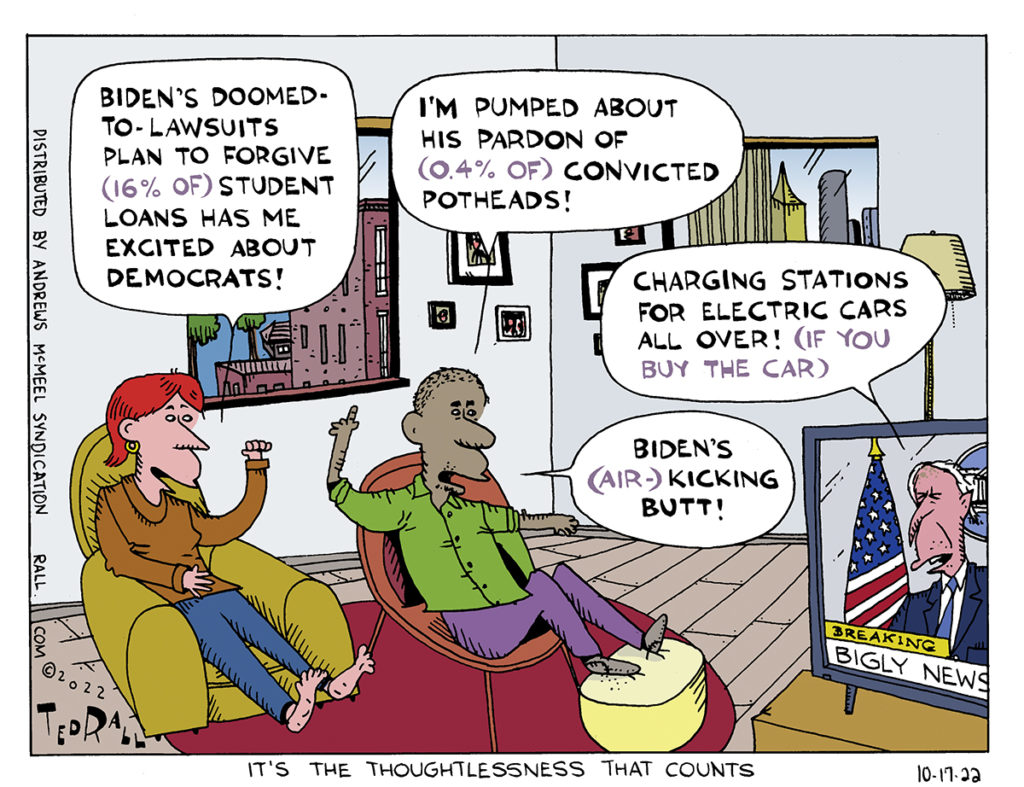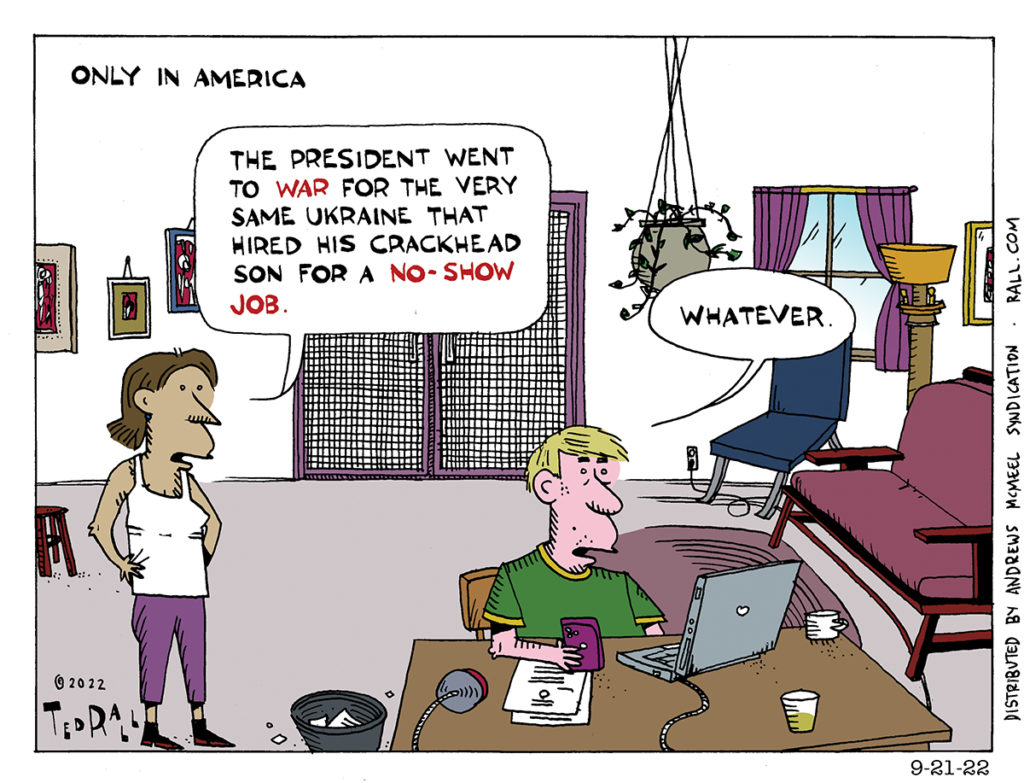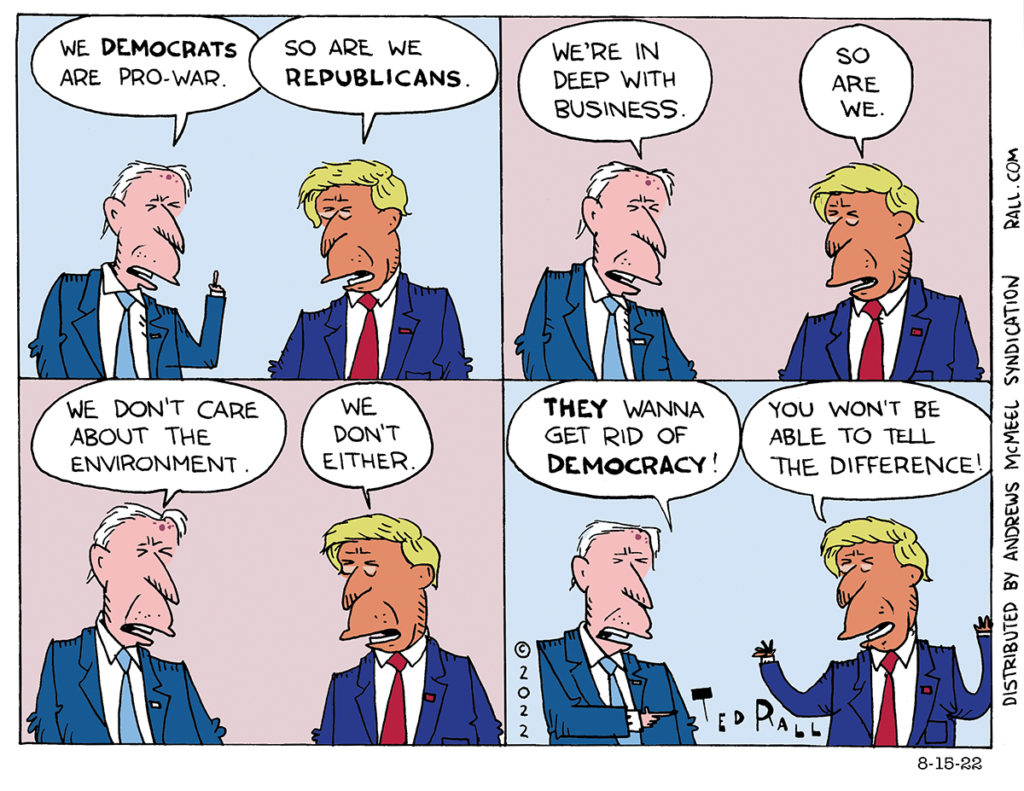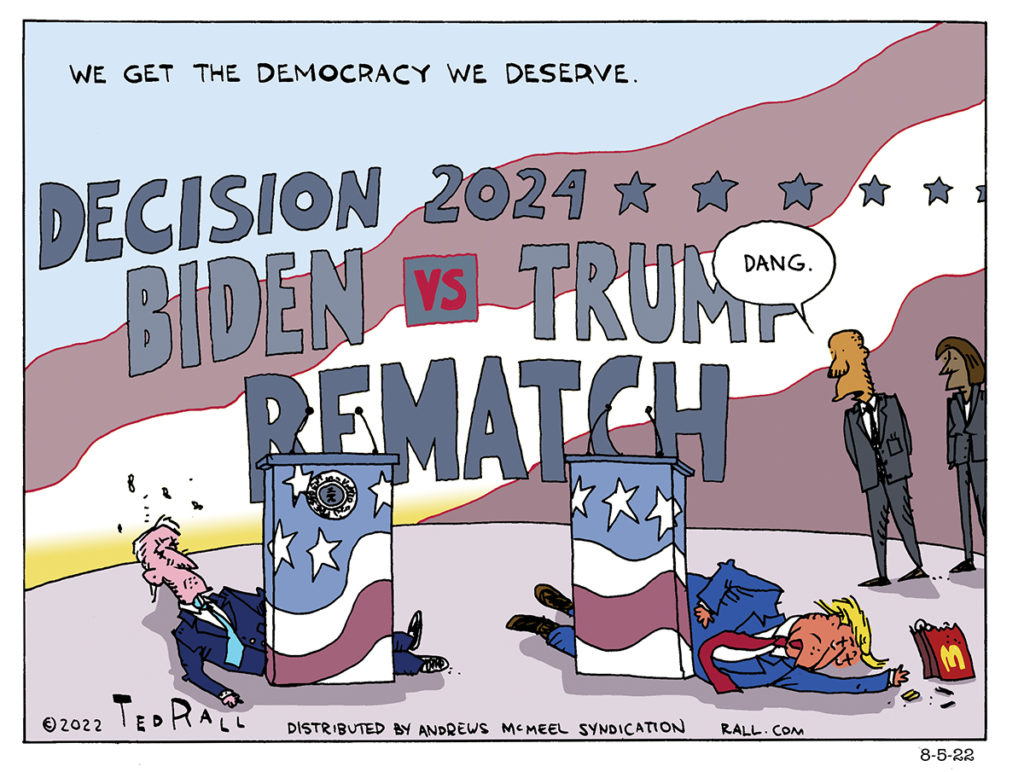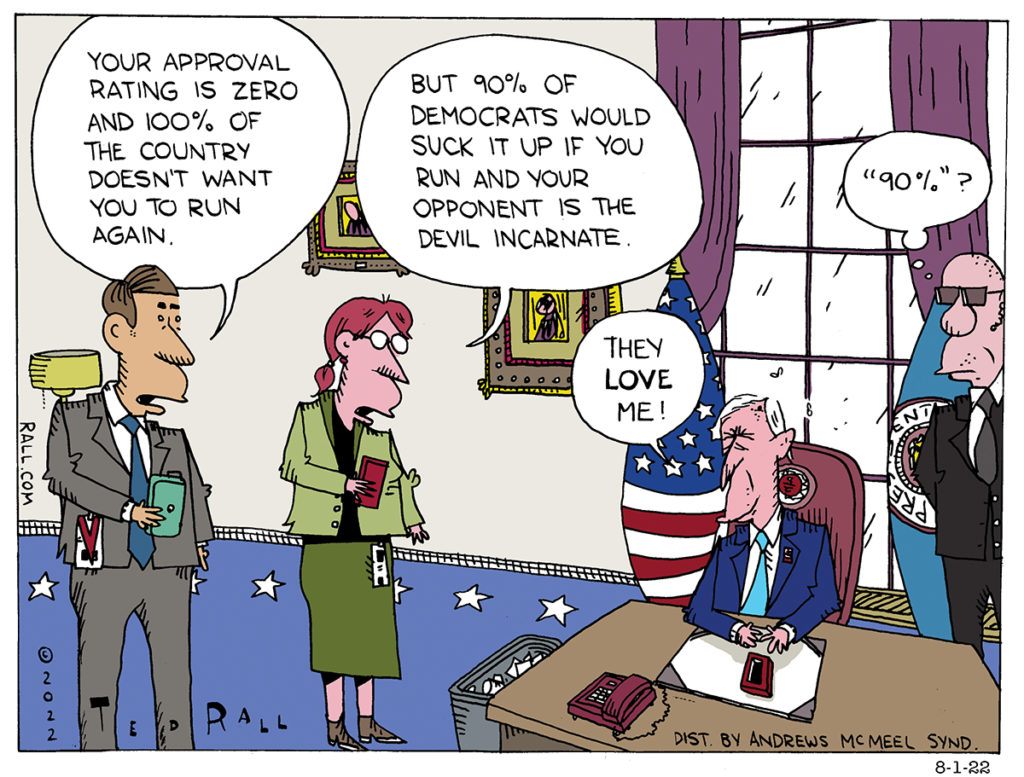Apparently as a way to promote the Democratic Party leading into the 2022 midterm elections, President Biden is pushing through executive orders that make headlines but don’t have much practical effect. It seems to be helping at the polls, but what happens when voters learn the truth?
Only in America
Supporters of Ukraine in its conflict with Russia seem unable to understand the terrible optics of the fact that President Biden, who has essentially entered the war on the side of Ukraine, has a drug addict son who received a lucrative no-show job from Ukraine. There is no distinction between the appearance of conflict of interest and actual conflict of interest.
Like Going after Al Capone for Taxes
Former President Donald Trump faces legal and political jeopardy on many fronts. He is arguably guilty of treason for attempting to conspire to overthrow the government on January 6, 2021. As a real estate developer in New York, he engaged in shady tax filings. There have been allegations of fraud. He hobnobs with political extremists. Given all this, it seems strange that what we are talking about, and what the FBI and the Department of Justice are going after him about, is the relatively minor issue of documents that he took out of the White House without permission.
Democrats Should Stop Crying Trump
 As a businessman, Donald Trump did a lot of terrible things. He stiffed vendors. He hired illegal immigrants as construction workers and abused them. People went into debt paying for his fake university education.
As a businessman, Donald Trump did a lot of terrible things. He stiffed vendors. He hired illegal immigrants as construction workers and abused them. People went into debt paying for his fake university education.
As a president, Donald Trump was awful. He kept children in cages. During the pandemic he promoted quackery and denied science. He stacked the Supreme Court with right-wing cretins. He claimed Biden stole the election, then encouraged his supporters to keep him in office by means of a coup.
The truth about Trump is bad enough. So when Democrats and anti-Trump Republicans describe Trump as an existential threat to democracy, God, apple pie, cat videos and everything good and decent in the world, they’re abandoning high political and moral ground that ought to be easy to hold.
No matter what you think of the former president, one fact belies the overheated handwringing that defines Trump Derangement Syndrome: he served four years, yet here we still are. No World War III. The Constitution remains in effect. Cities are not burning, though they’ve become seriously sketchy. Trump’s coup attempt was, like many of his projects, hardly planned and half-assed executed, and fizzled in a matter of hours.
In some respects, Trump did well. He negotiated and ordered the U.S. withdrawal from Afghanistan. He held high-level talks with North Korea. He oversaw Operation Warp Speed, which suspended regulations in the interest of developing the COVID vaccine in record time. It is unlikely that Hillary Clinton would have done that stuff.
When President Biden argues, as he did recently in Philadelphia, that “Donald Trump and the MAGA Republicans represent an extremism that threatens the very foundations of our republic,” even the most fervent Democrat has to ask themself: if that’s true, why is the republic still standing after four years of this dangerous despot? If Trump wanted to replace our system of government with “semi-fascist” authoritarianism, why would he have waited four long years to do so before ultimately missing his chance—unless, and this is really insane, he’s plotting to finally pull the trigger during his upcoming possible second term?
Trump is what he is and what he is is reprehensible: rhetorically divisive and bigoted, rabidly anti-intellectual, callous and disrespectful of the high office he held, the nation whose government he headed and the deep need of the people for leadership that takes everyone who lives here, citizens and non-citizens, into careful consideration. It is not, or at least ought not to be, necessary to exaggerate Trump’s toxic politics or personality.
Yet that is exactly what Democrats keep doing.
Los Angeles Detective Mark Fuhrman claimed he found one bloody glove at the scene of Nicole Brown Simpson’s murder and its match at O.J.’s house, thus justifying a search. That story seemed too good to be true. I believed that Fuhrman found both gloves at Nicole’s place and took one to O.J.’s so he could link him to the killing—O.J. was guilty, he thought. Why not give justice a little assist? The answer, of course, is that the jury didn’t buy the prosecution’s too-neat story. So O.J. walked. Legally correct; cosmically heinous. And it’s prosecutor Marcia Clark’s fault.
Like Fuhrman, the anti-Trump coalition—DNC-aligned media outlets, Democrats, anti-Trump Republicans and their allies in “deep state” strongholds like the FBI—is so determined to nail their quarry that going after him for his actual crimes isn’t enough. They want to be really, really sure he goes down. So they exaggerate Trump’s sins and, in notable cases, make them up out of whole cloth.
January 6th, tax fraud, sleazy business deals, hobnobbing with right-wing extremists—all these offer more than enough grist for a competent political team to kneecap Trump with a disciplined campaign of attack ads and drum up support for civil and perhaps criminal prosecution on the most serious charges. The problem for Democrats is, they keep focusing on lines of attack that were neither true nor could ever have been true—so their credibility is in tatters.
They are the boys who cried Trump.
There was the now-debunked Steele dossier and its sensational—and ridiculous—claim that Trump, a famous germaphobe, hired Russian prostitutes so he could watch them pee on his hotel bed in Moscow…because the Obamas had once slept in said bed. Uh-huh.
During the 2016 campaign Trump said: “Russia, if you’re listening, I hope you’re able to find the 30,000 emails that are missing, I think you will probably be rewarded mightily by our press.” Watch the video. It was clearly a joke. Yet corporate media insisted for years that Trump meant it seriously—because, obviously, that’s exactly the way you’d make such a covert, fraught, illegal, international request—and, even more absurdly, that Russian government hackers (who, if they existed, were not actually government employees) got straight to work on Trump’s assignment the very same day.
The mother of all disinformation campaigns, still ongoing on a cable-television channel near you, was Russiagate—the conspiracy theory that Trump cheated his way into the White House with the help of those self-same Russian hackers. For a man who was allegedly a stooge of Vladimir Putin, however, Trump’s presidency was marked by deteriorating relations with the Kremlin from start to finish. In the end, of course, what never made sense became perfectly clear; the real conspiracy in 2016 was Hillary’s; it turned out that Clinton campaign lawyer Michael Sussman ginned up the Trump Russiagate hoax and fed it to the FBI with the hope that the ensuing investigation would smear Trump and the Republicans as foreign operatives.
It is entirely possible to look at Trump and his opponents and conclude: they’re both worthless liars, albeit about different matters.
The alternative having failed them repeatedly, it is perhaps time for Democrats to try a new line of attack against Trump: playing it straight.
Why not go after the guy for what he’s actually done?
(Ted Rall (Twitter: @tedrall), the political cartoonist, columnist and graphic novelist, co-hosts the left-vs-right DMZ America podcast with fellow cartoonist Scott Stantis. You can support Ted’s hard-hitting political cartoons and columns and see his work first by sponsoring his work on Patreon.)
DMZ America Podcast #63: Student Loan Forgiveness, Quiet Quitting and Zelensky’s Big Lie
Joe Biden wants to forgive up to $20,000 per student loan borrower. Ted and Scott do a deep dive into who qualifies and why and why it’s weird, and Scott takes a stand against executive action rather than congressional debate in the situation. America’s favorite left-wing and right-wing political cartoonists discuss the phenomenon previously known as slacking, now known as “quiet quitting.” Finally, Ukrainian President Zelensky has been outed as a major liar to the Ukrainian people, some of whom are not pleased about it. In a democracy, or what passes for one, what if anything are the people entitled to know?
Who Can Tell the Difference?
Democrats complain, correctly, that Republicans are trying to subvert democracy with voter suppression and other tactics. But what democracy are they trying to subvert? Both parties are far more similar than anyone would like to admit, meaning that there isn’t really a true choice at the ballot box in the first place.
In Actual Russia, No Sign of Sanctions
It’s time to get real. It’s been time to get real. Russia has won its war against Ukraine.
This outcome comes as no surprise. Anyone with access to a map could see that the chances of Ukraine prevailing against Russia were slim to none.
The only way Ukraine could have emerged victorious—which would, according to the Ukrainians themselves, mean pushing it out of Crimea and deposing the separatist pro-Russian republics of Donetsk and Luhansk—would have been if the United States and its Western allies had been willing to launch nuclear weapons, which would have led to global annihilation. Once the decision was made not to start World War III, Ukraine’s defeat became inevitable. This, everyone sane knows, is for the best.
Determinative to this conclusion was an unusual pair of motivations. Normally, when a war is fought on one country’s territory, the invaded country fights harder than the invading forces. Paradoxically, despite suffering damaged infrastructure, the invaded state enjoys the homefield advantages of complete knowledge of the battlefield and much shorter supply lines. Aside from sporadic cross-border missile strikes, this war has been fought entirely on Ukrainian territory.
This conflict is different because Russia has to win; it cannot walk away. Ukraine has a 1,200-mile border with Russia, it wants to join an anti-Russia military alliance and its government was openly hostile to Russia before the war. And when Germany invaded the Soviet Union in 1941, its armies came through Ukraine, where the Nazis were greeted as liberators. Unlike America, which could bring its troops home after losing on the other side of the world in Afghanistan and Iraq and shrug off its imperialist misadventures and could leave Vietnam after pretending that more political will on the home front would have resulted in victory, Russia sees its military operation as existential. Ukraine isn’t a misbegotten side project. It’s as essential in the same way the United States would respond to a Canada that turned hostile to the U.S.
Unfortunately and dangerously, American media consumers are being pounded with an endless deluge of propaganda promoting the ludicrous idea that Ukraine is winning and/or will ultimately prevail militarily. This fantastical assertion props up political support for shipping $60 billion worth of weapons to Ukraine, with more on the way—never mind the 70% that Zelensky’s wildly corrupt government sells on the black market and the Javelin missile systems that wind up for sale on the dark web. (Christmas is coming! Don’t forget your favorite political cartoonist and columnist.) By way of comparison, the U.S. Department of Health and Human Services estimates that we could abolish homelessness here for $20 billion.
We’re also being told that Russia is crumbling under the crushing blow of vicious Western sanctions deployed as part of the White House’s openly-stated war aim that it wants “to see Russia weakened.” The Russian economy, it is said, is collapsing. Russian elites, they say, will soon overthrow President Vladimir Putin.
Let me tell you firsthand: there is zero sign of economic distress in Russia.
I’ve spent the last two weeks in Moscow and Saint Petersburg, Russia’s two biggest cities. Stores are bustling, people are spending, unemployment is low and still falling, there are lines at ATMs and whatever else is happening, the economy is anything but bad. The Galeria Mall across the busy street from my hotel in Saint Petersburg has a few closed stores shut down by Western chains but the majority remain and consumers are shopping like mad. European and American tourists are few and far between, but it’s exactly the same here in sanctions-free Istanbul where I’m writing this. Westerners stopped coming at the start of the COVID-19 lockdown two years ago and still haven’t returned. If Russians are unhappy with Putin—and they’re not—it’s not because of the economy.
I know from bad economies; where I live in New York, crime is out of control, homeless people go untreated for an array of mental illnesses and some are killing people, and being killed, and many storefronts have been empty and boarded up since the beginning of the pandemic. Any New Yorker would or should happily trade places with their Muscovite counterpart, who lives in a city with clean streets and subways that don’t serve as rolling homeless shelters and where life feels as if COVID-19 was never a thing. News stories that claim Russia is on the ropes are a giant magnificent pile of lies so over-the-top that I can’t help but be impressed by their glorious audacity and easily-debunked mendacity. All you have to do is go to Russia, as I did, and see for yourself that it’s all bull—but hey, that’s a lot of trouble—because of sanctions that seem to be hurting us more than them.
Self-delusion is more fun. Who, after all, should you trust? The same U.S. state media that told you Saddam had WMDs? Or some cartoonist-columnist who told you, well in advance, that the U.S. didn’t stand a chance in Afghanistan, Trump would win in 2016 and that he would attempt a coup d’état to remain in power?
(Ted Rall (Twitter: @tedrall), the political cartoonist, columnist and graphic novelist, co-hosts the left-vs-right DMZ America podcast with fellow cartoonist Scott Stantis. You can support Ted’s hard-hitting political cartoons and columns and see his work first by sponsoring his work on Patreon.)
The Democracy We Deserve
A lot can and will change between now and 2024, but currently the frontrunners for the Democratic and Republican nominations are the same exact septuagenarians who ran last time. And one of them is about to become an octogenarian. Whatever else the United States is, it’s not a great example for the rest of the world. Either, or both of these guys, could easily die on the campaign trail.
Hanging on the Flimsiest of Hopes
Joe Biden’s latest approval ratings for president Joe Biden are 33%, which is pretty much a deal killer for a reelection campaign. Two out of three Democrats don’t even want the president to run again. He is changing his hopes on the fact that 92% of Democrats would vote for him over Donald Trump, but of course, 92% of Democrats would vote for a rutabaga over Donald Trump. Besides, who are these 8%?
What’s Worse Than Inflation? Fighting Inflation.
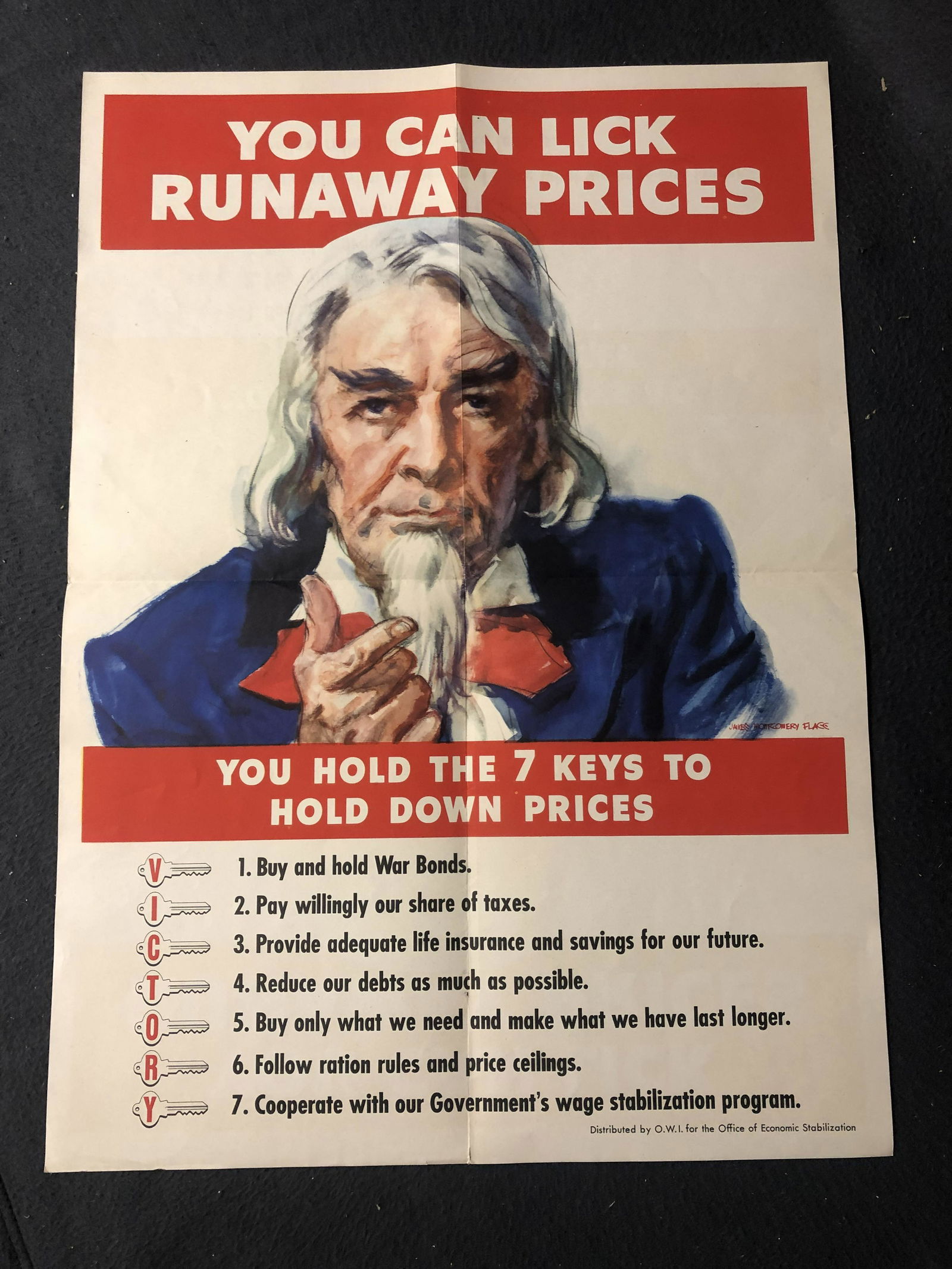
Inflation is a cancer. It eats away at savings and consumer confidence. But the tools the United States government uses to fight inflation are often worse—they’re a form of chemotherapy that’s even more likely to kill the economy than the underlying disease. When your car is careening down a hill, slamming on the brakes is an inexperienced driver’s first instinct. But it’s the last thing you should do. Unfortunately, the history of inflation-fighting indicates that monetary policymakers seem to prefer crashes to soft landings.
Fueled in large part by massive deficit spending as the Pentagon tried to bomb its way to victory in the unwinnable Vietnam war, inflation ran rampant from the latter part of the presidency of Richard Nixon through that of his successor Gerald Ford, and infamously contributed to the destruction of Jimmy Carter’s reelection chances.
Inflation encourages consumer spending because, if you put off a purchase, it will cost more later. Enter Paul Volcker, appointed to the chairmanship of the Federal Reserve Bank in 1979. Determined to radically reduce spending and wages, he applied the anti-stimulus of sky-high Fed interest rates that peaked out at nearly 20% in 1981, Reagan’s first year in office. The result was two back-to-back recessions, which saw unemployment soar even higher than during the Great Recession of 2008-11.
Inflation was dead for the foreseeable future. With the benefit of hindsight, however, the cost of taming inflation was too damn high.
Reagan’s supply-side policies, which centered around tax cuts for large corporations and wealthy individuals coupled with austerity for everyone else, combined with Volcker’s hard line on inflation to create an anemic mid-1980s recovery before the 1987 stock market crash marked the start of yet another Republican bust.
It is, of course, impossible to brush away the cynical conclusion that crushing workers and their economic power was and remains a feature of the capitalist system and its stewards in government and finance. Reagan and his merciless smashing of the air traffic controllers union—leading to years of union-busting—coincided neatly with those 30+ years of non-existent raises, as well as private-sector union membership falling off a cliff. Throughout the 1950s, 1960s and 1970s, there were between 200 and 400 major strikes by labor unions each year. When Reagan left office in 1988, there were 40. There were just seven in 2017.
Unsurprisingly, taking away power from workers and giving it to bosses made things worse for workers. The Reagan years radically widened the income gap between low- and high-income earners for the following three decades—even though the average American worker was increasingly efficient and productive year after year. Between 1979 and 2019, productivity increased 60% while wages only went up 16%. Windfall profits went to shareholders and owners.
Ironically, wage stagnation came to its merciful, all-too-brief conclusion in 2020, when people weren’t working at all. Between March and June of that year, when many furloughed workers were sitting at home during the COVID-19 pandemic lockdown, government stimulus checks caused real wages to increase relative to inflation. Increased savings allowed employees to quit in droves in the so-called Great Resignation; labor unions chalked up some impressive victories as emboldened wage slaves stood up for themselves.
The worst inflation crisis of the past century was sparked by the end of World War II-era price controls on a wide array of rationed commodities and a surge in pent-up demand. (The latter is, at a smaller scale, the main force behind inflation today.) In 1947, the inflation rate rose to 20%. What’s interesting is what the Fed did not do in response: raise interest rates. It couldn’t. It didn’t have that power then.
Instead, fiscal policy makers refused to extend additional credit to the big banks — which had contributed to inflation — and waited for consumers to satisfy their pent-up demand. This they did by 1948. With no one to slam on the brakes, there was a quick, mild recession in 1949 followed by an impressive period of economic expansion in the 1950s. This episode from the Truman era strongly suggests that current Fed policy of raising short-term interest rates is a mistake. The only solution to pent-up demand is no solution at all. Just sit back and wait.
(Ted Rall (Twitter: @tedrall), the political cartoonist, columnist and graphic novelist, co-hosts the left-vs-right DMZ America podcast with fellow cartoonist Scott Stantis. You can support Ted’s hard-hitting political cartoons and columns and see his work first by sponsoring his work on Patreon.)

